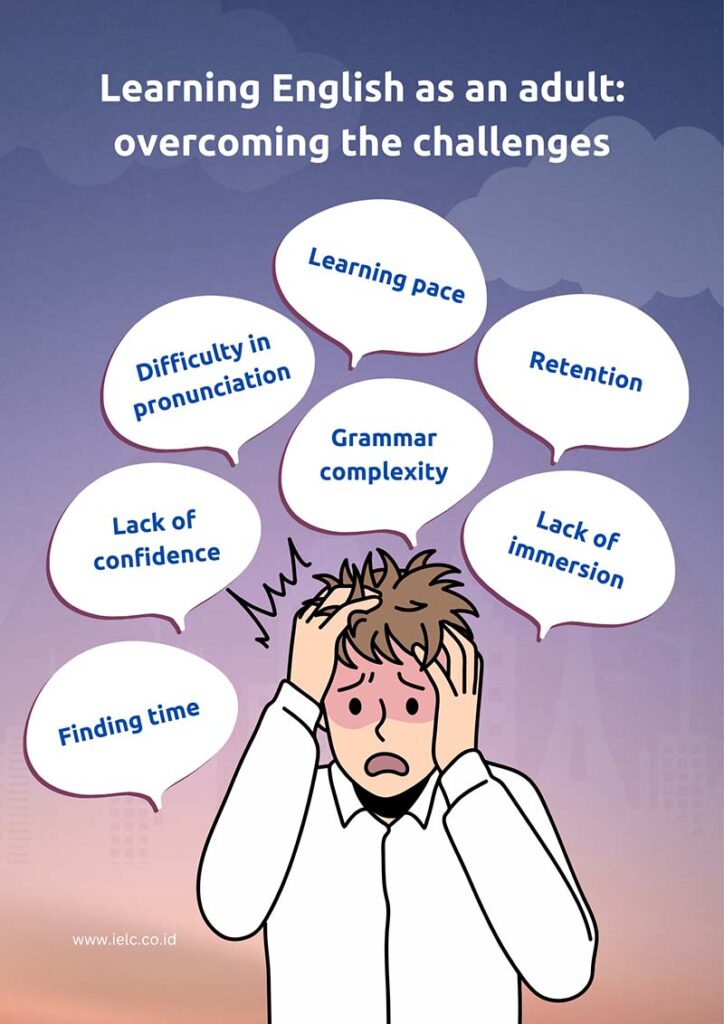
Learning English as an adult: overcoming the challenges
Welcome back, learners!
So, you’ve decided to embark on the exciting journey of learning English as an adult, eh?
Well, hats off to you! This courageous step demonstrates your willingness to step outside of your comfort zone and embrace the unknown.
Now, before we dive in, let’s acknowledge the elephant in the room.
Is learning English as an adult intimidating? Absolutely! Is it impossible? Absolutely not!
You see, as adults, our lives are often filled to the brim with responsibilities that might make it seem impossible to squeeze in the time for something as monumental as learning a new language. Or perhaps you’ve heard that age-old myth that kids are language learning prodigies, and we adults just don’t cut it.
Well, it’s time to shake off those misconceptions and gear up to prove them wrong!
In this article, we’re going to explore some of the common challenges adults face when learning English and arm you with some practical strategies to overcome them!

1. Finding time
Time, or the lack thereof, is often the most substantial wall adults hit when they decide to embark on the learning journey. Be it work, family, or other commitments, our plates are full to the brim!
It’s not uncommon to feel overwhelmed, seeing the task as another substantial item on an already packed to-do list. But guess what? There’s a solution, and it’s not as complex as it may initially seem.
When we say ‘learning’, the image that often comes to mind is sitting at a desk, surrounded by textbooks, notes, and pens. Now, that’s a time-consuming activity! However, learning a language doesn’t have to be that way. Here’s the secret – you can learn English without setting aside dedicated ‘learning time’.
Sounds too good to be true? It’s not!
Here’s how you can do it:
Integrate English into your existing daily routine. Weave it into your everyday life. Got a long commute to work? Listen to English podcasts or audiobooks. Waiting for your lunch order? Read an English news article or a blog. Relaxing after dinner? Watch an English movie or TV show. See the trick here? You’re learning without adding any extra activities to your day!
You can also consider setting short, achievable daily goals. A goal such as “Learn 5 new words a day” or “Practice speaking for 15 minutes a day” can work wonders without overwhelming you.
2. Lack of confidence
Unsure of your English pronunciation? Concerned about your grammar? Fearful of making a fool of yourself in front of others? Sounds like you’re wrestling with the monster called ‘lack of confidence’. It’s a common nemesis for many adults embarking on the journey of learning a new language, but fret not, it’s one we can overcome together!
Firstly, let’s have a heart-to-heart, shall we? Fear of making mistakes is natural, but guess what’s even more natural? Actually making those mistakes!
Yes, you read that right. Making mistakes is an essential and inescapable part of the learning process. When we trip over a tricky word or botch up a sentence structure, we’re essentially laying down a marker for future improvement. So, let’s shift our mindset and start viewing these blunders not as embarrassing slip-ups, but as crucial stepping stones on the path to proficiency.
However, we understand that it’s easier said than done, especially when the spotlight’s on you in a conversation. So, here’s a suggestion: Start small and safe. Practice in a supportive environment. This could be with patient friends who are native English speakers or fellow learners who understand your journey because they’re on the same path. They won’t laugh at your mistakes; they’ll help you learn from them.
Also, consider joining online language learning communities or finding a language exchange partner. These platforms are full of individuals just like you, adults learning a new language, making the same mistakes, and sharing their experiences. In these communities, you’ll find not only resources to improve, but also the motivation to keep going and the reassurance that everyone’s in the same boat!
3. Difficulty in pronunciation
Do you find that certain English words are tricky to pronounce? Maybe it’s the ‘th’ sound thwarting you? Is the rolled ‘r’ leaving you in a rut? Does the subtlety of vowel sounds vex you?
Well, you’re not alone in this ‘Difficulty in Pronunciation’ boat. Many adults face the same obstacle while learning English. Certain English sounds, which do not exist in their native language, become tough cookies to crack.
But, before you throw your hands up in despair, remember – every challenge can be overcome with the right strategy and dedication!
If the English sounds are proving to be pesky, it’s time to rally up some reinforcements. Online resources like BBC’s pronunciation guide are excellent tools for visual and auditory learners. It offers videos, phonetic descriptions, and audio examples to aid you in navigating the labyrinth of English sounds.
YouTube is yet another treasure trove for pronunciation tutorials. It houses a plethora of videos covering everything from phonetics, tongue position, lip movement to guided pronunciation exercises.
For the tech-savvy among us, language learning apps with speech recognition technology can prove to be indispensable allies. These apps listen to your pronunciation and give immediate feedback, helping you fine-tune your speech right away. Talk about having a personal pronunciation coach in your pocket!
Lastly, don’t underestimate the power of an English course. A structured program with personalized feedback can give you the targeted assistance needed to master pronunciation. Plus, the chance to interact with skilled teachers and motivated learners can serve as a powerful motivational booster.
By the way, we can help! Contact us now to get your free consultation!
4. Learning pace
Children, with their spongy brains, might seem like those sports cars, absorbing new languages at light speed, while adults, due to the intricacies of mature brains, may take more time to learn English. But fret not, for slower does not mean stagnant!
But here’s the deal: learning English, or any language for that matter, isn’t a 100-meter dash; it’s more like a marathon. It’s not about sprinting to the finish line, but about maintaining a steady, sustainable pace!
Firstly, set realistic expectations for yourself. Learning a language is a complex process that involves acquiring new vocabulary, grasping grammatical structures, and developing listening, speaking, reading, and writing skills. That’s a lot! So, don’t expect to become fluent overnight. Language learning is a journey, so sit back, relax, and enjoy the ride.
Celebrate every milestone, no matter how small. Did you write an email in English entirely on your own today? That’s a win! Managed to understand the latest episode of your favorite English show without subtitles? You deserve a pat on the back! Each of these victories, small as they may seem, are stepping stones on your path to fluency.
5. Retention
As we mature, our memory may not hold onto new information as tightly as it once did during our younger years. We learn a new word in the morning, and by evening, it’s as elusive as a forgotten dream. Fret not, though! As always, every problem has its solutions.
First, let’s talk about a powerful technique called ‘spaced repetition’. It’s a fancy term, but the concept is straightforward – we revisit new words at increasing intervals over time. Try using flashcards for this. Write the English word on one side and its meaning on the other. Shuffle through them daily, and repeat the ones that give you trouble.
However, to really make these words stick, you need to see them in action. The more you use new words in practical, real-life contexts, the better you’ll remember them. Write them in sentences, use them in your daily conversations, or even sing them out loud in the shower! The key is to interact with new words in dynamic and meaningful ways.
6. Grammar complexity
Are irregular verbs throwing you off balance? Do phrasal verbs seem like a strange puzzle? Do tenses make your head spin? Don’t worry, you’re not alone!
English grammar, with its wide variety of rules and exceptions, might seem overwhelming at first. But remember, the key to overcoming this challenge is to adopt a systematic learning approach. Begin with the basic rules and gradually progress to the more complicated structures. This approach helps in laying a strong foundation, making it easier to grasp complex concepts.
Practicing by writing sentences using new grammar rules can be a great way to reinforce your learning. It helps internalize the rules and gives you a practical understanding of their application. So, try to write regularly using the new grammar rules that you learn.
Additionally, do remember to practice a lot. These exercises provide you with the opportunity to practice and reinforce what you’ve learned. The more you practice, the more familiar you become with the rules, and the easier it gets to remember and use them correctly.
Above all, be patient with yourself. Learning English grammar takes time and consistent effort. You might find some rules and exceptions challenging, but with consistent practice and determination, you will surely get the hang of them!
7. Lack of immersion
Ever heard of the term ‘immersion’? It’s a potent language-learning method that involves surrounding oneself with the target language in its natural setting. For instance, living in an English-speaking country to learn English. However, for most adults, this may not be feasible due to responsibilities and restrictions.
Despite this, it’s quite possible to recreate a similar environment at home. This could prove to be the solution you need for the ‘Lack of Immersion’ hurdle you’re encountering.
Begin by indulging in English TV shows and movies. Don’t just watch them for entertainment, but pay attention to the dialogues, phrases, and vocabulary used. Keep a notebook handy to jot down new words and expressions that you come across. And most importantly, don’t hesitate to pause, rewind, and rewatch!
Another effective way to immerse yourself in English is through music. Listening to English songs allows you to hear the rhythm, intonation, and pronunciation of the language. You could also read along with the lyrics to ensure you’re catching every word.
Reading books in English is also a fantastic method to immerse yourself in the language. It offers a wealth of vocabulary, grammar, and sentence structure insights that you can absorb at your own pace.
Lastly, you might want to consider changing the language settings on your devices to English. It’s a subtle yet effective way of integrating English into your daily life!
Be sure to read our tips to easily integrate English into your daily life here!
Summary
Embarking on the journey of learning a new language as an adult is no doubt challenging, but let’s remember it’s also highly rewarding and absolutely possible!
Weaving English into your everyday life, celebrating every small victory, making good use of modern technology, and treating mistakes as stepping stones to improvement – these are all effective strategies that can facilitate your English learning process.
As you continue to explore and conquer these challenges, remember that the journey of language learning is just as important as the destination. You’re not just learning to communicate in a new language, but also expanding your cultural understanding, improving cognitive abilities, and opening doors to new personal and professional opportunities!
Stay motivated, keep pushing, and before you know it, you’ll be chatting away in English like a pro!
Next steps
Do you want to speak English with confidence?
Most people lack confidence when they speak English. They are afraid to make mistakes and are embarrassed to speak in front of others.
This is because they have been taught English the wrong way!
Most English courses waste your time and money on useless exercises that don’t bring results. Even worse, they teach you bad habits that are very difficult to unlearn.
As a result, you become confused and lack confidence. This is wrong!
At IELC, we teach English the right way
Our goal is to get you speaking in English with fluency and confidence as fast as possible. We want to give you the skills you need to fulfil your potential!
Our experienced teachers will guide you along every step of the learning process to ensure that you are not wasting your time, money, and energy on useless language exercises & wrong methods.
Our courses
With our modern campus and technology, we are equipped to provide the best possible courses for children, teens, and adults, including:
Online and on campus IELTS courses
Online and on campus TOEFL PBT courses
Online and on campus TOEFL iBT courses
We offer our classes in group classes or private classes.
No matter what your goals are, our team will help you achieve these goals by providing you with Indonesia’s best English courses!
Talk to our team today to get your FREE consultation and take your first step towards success.
Sincerely,

IELC Academic Director
